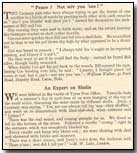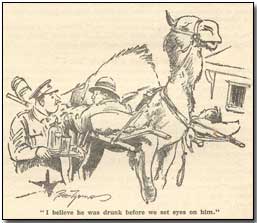Memoirs & Diaries - The Best 500 Cockney War Stories - "Peace? Not Wiv You 'Ere!" and Other Stories
 Published in London
in 1921, The Best 500 Cockney War Stories
comprised, in the words of its newspaper publisher (The London Evening
News) "a remembering and retelling of those war days when laughter
sometimes saved men's reason".
Published in London
in 1921, The Best 500 Cockney War Stories
comprised, in the words of its newspaper publisher (The London Evening
News) "a remembering and retelling of those war days when laughter
sometimes saved men's reason".
The collection of short memoirs, some 500 in total, is divided into five categories - Action, Lull, Hospital, High Seas and Here and There. This page contains five stories from Action, led by "Peace? Not Wiv You 'Ere!".
Other sections within the collection can be accessed using the sidebar to the right.
"Peace? Not Wiv You 'Ere!"
Two Cockney pals who were always trying to get the better of one another in a battle of words by greeting each other with such remarks as "Ain't you blinkin' well dead yet?" earned for themselves the nicknames of Bill and Coo.
One evening they were sent to fetch water, and on the return journey the Germans started to shell rather heavily.
Coo ran more quickly than Bill and fell into a shell-hole. He scrambled out in time to see his pal blown sky high by what appeared to be a direct hit.
Coo was heard to remark: " I always told 'im 'e ought to be reported missing, and blimey if 'e ain't."
He then went to see if he could find the body: instead he found Bill alive, though badly wounded.
When finally Coo got his pal back to the trench, Bill opened his eyes. Seeing Coo bending over him, he said: " Lumme, I thought peace 'ad come at last, but it ain't - not wiv you 'ere."
William Walker, 30 Park Road, Stopsley Road, Luton, Beds
An Expert on Shells
We were billeted in the vaults of Ypres Post Office. Towards dusk of a summer's day in 1916 four of us were lounging at the top of the vault stairs, discussing the noise made by different shells.
Jerry, a Cockney, was saying, "Yes, yer can always tell big 'uns - they shuffles," and went on to demonstrate with Shsh-shsh-shsh, when someone said: "Listen!"
There was the real sound, and coming straight for us. We dived or fell to the bottom of the stairs. Followed a terrific "trump" right in the entrance, which was completely blocked up.
Every candle and lamp was blown out; we were choking with dust and showered with bricks and masonry.
There was a short silence, and Jerry's voice from the darkness said, "There y'are; wot did I tell yer?"
H.W. Lake, London
A Camel "On the Waggon"
During the battle of Gaza in April 1917 camels were used for the conveyance of wounded. Each camel carried a stretcher on either side of its hump. Travelling in this manner was something akin to a rough Channel crossing.
I was wounded in the leg. My companion was severely wounded in both legs. Some very uncomplimentary remarks were passed between us concerning camels, particularly the one which was carrying us.
When we arrived at a field dressing-station a sergeant of the R.A.M.C. came along with liquid refreshments.
"Sergeant," said my chum, "if you give this bloke (indicating the camel) anything to drink I'm going to walk, 'cos I believe the blighter was drunk before we ever set eyes on him."
Albert J. Fairall, 43 Melbourne Road, Leyton, E.10
Parting Presents
It was on Passchendaele Ridge in 1917. Jerry had been giving us a hot time with his heavies. Just before daybreak our telephone line went west and we could not get through to our O.P.
I was detailed to go out and repair the line with a young Cockney from Hackney. He had only been with us a few days and it was his first time up the line.
We had mended one break when shells dropped all round us. When I got to my feet, I saw my pal lying several feet away. I escaped with a few splinters and shock. I dragged my chum to a shell-hole which was full of water and found he was badly hit about the shoulder, chest, and leg. I dressed him as best I possibly could, when, bang, a shell seemed to drop right on us and something came hurtling into our hole with a splash.
It turned out to be a duckboard. I propped my chum against it to stop him slipping back into the water. After a few minutes he opened his eyes, and though in terrible pain, smiled and said, "Lummy, Jeff, old Jerry ain't so bad, after all. He has given me a nice souvenir to take to Blighty and now he has sent me a raft to cross the Pond on." Then he became unconscious.
It was now daybreak and quiet. I pulled him out of the hole and went and repaired the line. We got him away all right, but I never heard from him. I only hope he pulled through: he showed pluck.
Signaller H. Jeffrey (late Royal Artillery), 13 Bright Road, Luton, Chatham, Kent
Bluebottles and Wopses
We had just gone into the front line. Two of us had not been there before.
During a conversation with a Cockney comrade, an old hand, we told him of our dislike of bombs. He tried to re-assure us something like this: "Nah, don't let them worry you. You treat 'em just like blue-bottles, only different. With a blue-bottle you watch where it settles an' 'it it, but with bombs, you watch where they're goin' to settle and 'op it. It's quite simple."
A short time after a small German bomb came over and knocked out our adviser. My friend and I picked him up and tried to help him. He was seriously hurt. As we lifted him up my friend said to him, "You didn't get your blue-bottle that time, did you?"
He smiled back as he replied: "Twasn't a blue-bottle, mate; must 'ave been a blinkin' wopse."
C. Booth, 5 Creighton Road, N.W.6
Next - The Cheerful "Card" and four other stories
"Suicide Ditch" was a term used by British soldiers to refer to the front-line trench.
- Did you know?

